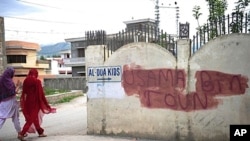The decision by the Obama administration to go after Osama bin Laden at his hideout in Pakistan without informing the government in Islamabad has officials there angrily denouncing the mission as a violation of its sovereignty.
Several days after the U.S. commando raid that killed bin Laden, the Pakistani military warned that any future U.S. operations on Pakistani territory will result in a review of military and intelligence cooperation with the United States.
And Pakistan's Foreign Secretary Salman Bashir used harsh words last week, warning of "disastrous consequences" for any nation that carries out unauthorized military actions in Pakistani territory.
For its part, top U.S. officials have said they did not give Pakistan, America's key ally in the war on terror, prior warning because of concerns that bin Laden or his associates might be tipped off.
The highly risky military operation, performed by an elite squadron of U.S. Navy SEALs, has raised questions about its legality under the confines of international law.
VOA's Paul Westpheling discussed the issue with Matthew Waxman, an associate professor of International Law at Columbia Law School in New York City.
Was this raid on bin Laden's compound outside the Pakistani capital a violation of international law in the sense that in infringed on the country's sovereignty?
"In normal times, it would be a violation of a state's sovereignty to launch this kind of raid without their consent. On the other hand, there are circumstances in which a state would be entitled to take action against the terrorist organization or terrorist agents in another state's territory when that state is unwilling or unable to take its own action against it. In this case, I think there is a good argument that the United States was justified as a matter of self-defense."
What about this unwilling or unable test, is this a consideration when one is debating whether or not international law has been breached?
"This is a contested area of international law, in part because, while there have been many previous cases involving self-defense against non-state groups, this is not a very common pattern in international law. And so the law of self-defense in this area is contested. I think there is a substantial body of opinion that would hold [that] the use of force in circumstances like this, if the host state is unwilling or unable to take action itself, would be legal so long as it comported with certain constraints, including that the use of force was necessary, that the actions taken were proportionate to the threat that was being faced, [and so on]."
When the United States invaded Iraq, for example, the U.S. knew who the enemy was, knew where they were. Here governments are trying to combat an organization called al-Qaida, which appears to have no home base. So does it come down to following them and taking the battle to where they are?
"I do agree with the idea that the United States is engaged in an armed conflict with al-Qaida and its allies, a non-state enemy. Unfortunately, it's now possible for terrorist organization to now wage violence on a level of intensity and sophistication, previously only achievable by states. As you point out, this leads to some difficulties in applying the laws of war because the boundaries of that enemy organization are not always as clear as they would be when you are fighting against another state."
Chapter 7 of the United Nation's Charter talks about self-defense, how does that apply here?
"The U.N. Charter contains a baseline prohibition on the threat or use of force. But then it goes on to explain that states retain their inherent right of self-defense. So in a sense, a self-defense carves out an exception to the general prohibition on the use of force. In this case, the United States is relying on that exception, that it faces an ongoing threat from al-Qaida, a non-state actor with which the United States is engaged in an ongoing armed conflict."
How about the idea Pakistan's point of view? The American Society of International Law writes on its website "that the facts and politics in this case make it unlikely that Pakistan's defense of its sovereignty would find significant international support."
"Part of the reason why this is a very difficult issue of international law is we're seeing the clash of two important principles on international law. One is a principle of territorial sovereignty and another is the principle of self-defense."














